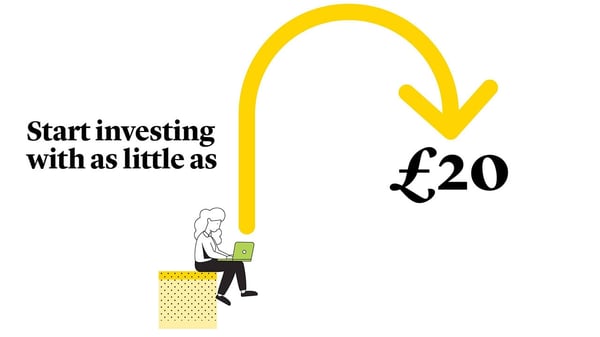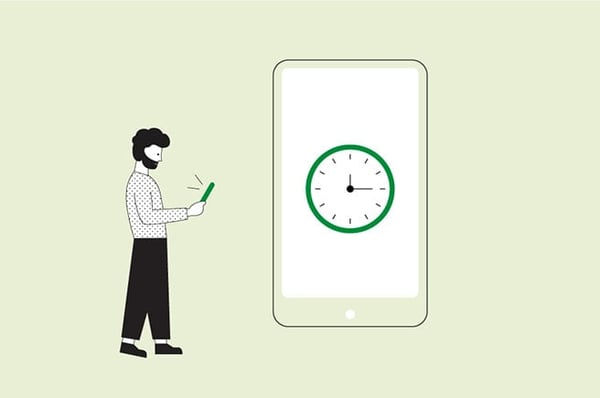
Your L&G ISA
Take advantage of our tax-efficient stocks and shares ISA and save for your future

Invest in your financial future
We’re very pleased to offer you a stocks and shares ISA, which is specially designed to help you save for your long-term financial goals.
If you have any questions about your salary deduction, please contact UPM Payroll.
Please remember the value of your investment will go up and down. It isn’t guaranteed, so you may get back less than you put in. Whilst an ISA is usually considered as a medium to long-term investment for at least five years, there is no fixed term for your investment.
Investing made simple

11 Dec 2023 / 01:04
Start investing today

Stocks and Shares ISA
Make a regular payment from £20 a month or £100 lump sum direct from your payroll.
You have two ways to invest your ISA
Whilst an ISA is usually considered as a medium to long-term investment for at least five years, there's no fixed term for your investment. If you're not sure about your options, we recommend you speak to a financial adviser. You can find one in your local area at Unbiased.
Listen to our podcast's ISA episode
We cover how ISAs work, choosing the right one for you and much more.
Kia: Welcome to another episode of A Little Bit Richer. This is Kia, and today we're talking ISAs. We touched on them in a few earlier episodes, but we're diving a little bit deeper. You may notice at this time of the year there's always a bit of a buzz around ISAs because we're approaching the end of the tax year, the last chance to use your annual allowance. And in the recent budget, a new ISA was announced, so we thought it would be great to explain the basics including when an ISA is a good idea and when it probably isn't.
A Little Bit Richer is brought to you by Legal & General. So who better to talk about this topic than the ISA product manager at Legal & General, Fahad Ahmed. Welcome, Fahad.
Fahad: Hi, Kia. Thanks for having me.
Kia: Thank you for coming. So, could you talk us through what ISAs are and the different types and why could an ISA be useful to some of our listeners?
Fahad: Absolutely. So, ISAs, it stands for an individual savings account and it's a tax efficient way for you to either save or invest your money. What that means is you don't have to pay tax on any returns that you get, which is obviously it's a great thing because it means more money in your pocket.
There's a few different types of ISAs. So, we've got stocks and shares ISAs, cash ISAs, lifetime ISAs, and there's even junior ISAs, which is for under 18s. We're going to talk more about what each ISA is and when they might be appropriate. But a key thing to bear in mind is that you don't have to pick just one. You can mix and match. Just as long as you don't go over your annual allowance, which is 20K.
So, just as an example, you could put 1, 000 pounds into a stocks and shares ISA. You could put 500 pounds into a cash ISA, and if you want, you could put 4, 000 pounds into a lifetime ISA. At the moment, you're only able to save or invest into one of each type of ISA in a tax year. However, this is going to be changing next month. In the new tax year, you'll be able to save or invest into multiple ISAs of the same type.
Kia: So, you've explained what they are, which is great, but why could an ISA be useful to some of our listeners?
Fahad: It's a way of investing or saving where you don't have to pay tax. So, that's a wonderful advantage. They're a good way, especially stocks and shares ISAs, you can see really good long- term growth.
Kia: Amazing. So, let's just say you might have some money and you want to save it, right? But you might need it in the next few years. So, opening a cash ISA might be the option that you go for. Can you give us a bit more detail on these accounts?
Fahad: Yeah, for sure. So, a cash ISA is a type of savings account where you don't have to pay tax on the interest that you earn. It's good for shorter term savings. When we're saying shorter term, we're talking about under five years. There's a few different types of cash ISAs. So, you've got instant access cash ISA, so that you can access your money as and when you like. You've got fixed rate cash ISAs, so this is where you put your money away for a fixed period of time, it is usually between one and five years.
Then you've got something called notice cash ISAs. When you want to take money out of this, you've got to give a certain period of notice, usually 30 days, 60 days, or 90 days. And then finally, you have regular cash ISA or regular saver cash ISAs. So, with these you have to commit to putting in a certain amount every month.
The thing to bear in mind with these is that there's usually a trade- off between flexibility and the interest rate that you get. So, for example, with the instant access cash ISA, since that one's the most flexible, it's generally going to offer the lowest interest rate. Another thing to bear in mind is that the interest rate that you get, it can vary quite widely depending on which provider you go with.
If you've decided you want to go for a cash ISA, you want to do your research and compare different providers and make sure you're getting the best rate out there. The best way to do this is just to jump onto Google, search best cash ISA, and then what you'll get is comparison websites. If you go onto these websites, then in a very simple way, they'll lay out tables and things like this and they'll make it very easy for you to identify which ISA has the best rate for you.
Kia: I think that's really good, like you said, comparing the different rates and understanding the trade- off between the different types is what you need to factor in depending on what your goal is for your money.
A question that I know a lot of people will have is how safe is their money? I think that's all that people think. You're saving big amounts, but is my money safe? So, is your money safe if you're putting it into something like a cash ISA?
Fahad: So, what you need to make sure when you do pick a provider, you need to make sure that it's UK authorized and somewhere on the provider's website there should be mention of something called the FSCS, and this stands for Financial Services Compensation Scheme. This will make sure that your money is safe and secure up to 85,000. Now, obviously, we said the cash ISA limit is 20,000 a year, but just in case you're somebody who's really fortunate and has that much money, can accumulate that over the years, up to 85, 000 pounds, your money will be safe and secure.
Kia: So, if someone were to open up a standard savings account, so i. e., not an ISA account, would they still need to pay tax on any interest that they earn?
Fahad: Not necessarily. So, we do also have something called a personal savings allowance. Now, if you are a basic rate taxpayer, that means you're currently paying 20% in income tax, you have a personal savings allowance of 1,000 pounds. So, what this means is that you can earn up to 1,000 pounds in interest before you have to worry about paying any tax on that.
If you are a higher rate taxpayer, so you're paying 40% in income tax, your personal savings allowance is 500 pounds. And that means you can earn up to 500 pounds in interest without having to pay tax on it. If you earn, let's say for example, 550 pounds, the 500 pounds, tax- free, and that additional 50 pounds you'll have to pay tax on that.
So, if you are just saving, let's say, a couple of hundred pounds, or even in the low thousands, it might be the case that a standard savings account is actually better than a cash ISA, because you can find sometimes they have better rates.
What I would say, though, is if you do go for a standard savings account, make sure that you're keeping an eye on your balance, especially if you're putting money in on a regular basis every month, because situations can change quite quick. You might think, oh, you're miles away from actually exceeding your personal savings allowance, but let's say you get a salary increase that pushes you to be a higher rate taxpayer, then your personal savings allowance is going to half just like that. So, just keep an eye on it and be prepared that at some point over the coming months or years, just be ready that it might be a good option to transfer your money to a cash ISA.
Kia: That's really good to highlight. I think a lot of people don't realize that they have a personal savings allowance.
Fahad: Yeah. Yeah. Yeah.
Kia: So, like you said, it's just keeping in mind how much you earn and how much tax are you paying and what does that mean for your savings? And maybe do you need to switch to an ISA that's going to be better suited for you? But as we always say, personal finance is personal, so make sure you're making decisions that's best for your personal situation.
Let's move on to investing. So, if someone is considering investing in the stock market, could a stocks and shares ISA be worth taking a look at?
Fahad: Yeah. So, I'm going to be a little bit biased because of my job, but I absolutely love stocks and shares ISAs. So, first of all, you've got that tax- free element that we spoke about. So, any money that you make through gains in the stock market, you don't have to worry about paying tax on it.
The good thing about stocks and shares ISAs is that if you invest for the long term and we're talking about over five years, you can generally expect to see better returns than what you would see if you just left your money in, let's say, your current account or even a cash ISA. So, that's another thing that's really good.
I do need to stress though that with stocks and shares ISAs, it's an investment and when we're talking about investing, it's all about the long term. It's all about that minimum five years. That's the key number to remember. But the longer you leave your money invested, the more chance there is that you'll actually see positive returns. As I said, though, it's an investment, so your money, it will go up and down and you could actually get back less than you put in.
Kia: Investing, it's always that thing, people are thinking about the future, thinking about how they can grow their money and it's a good thing to have a look at. If you do want to start investing, it's a good account to definitely have a look at.
Fahad:The thing is, it's really good for beginners and that's the thing that's so good about it.
Kia: I agree.
Fahad: So, even if I think back to myself before I had opened a stocks and shares ISA, let's go back a few years, so even before I was working in financial services, anything like that, when I had just graduated, I was actually working in retail at the time. And it was the first time I had a little bit of money coming in each month that I didn't have an immediate need for it. I could actually put it aside for the long term. And obviously, we've heard of this term investing and it's something I've heard of and I'm thinking, " Maybe I should invest some of this money." But the thing is, at the time I thought it was something that was so far away from me.
Kia: Right? It seems like a Wolf of Wall Street, that kind of stuff, that's so far away from reality.
Fahad: Exactly, Kia. I thought it was for people that, like you say, Wolf of Wall Street, they look a bit different to us. They've definitely got more money than us. So, to be honest, I put it aside for a while, I didn't think it was accessible for me and I found it a little bit daunting. But when I came across stocks and shares ISAs and in particular the options they have for how you can invest in it, that's when I realized, oh, actually, this could be for me.
So, if it's okay, I could just touch on those different options for how you can invest in a stocks and shares ISA. So, there's two main options. The first one is what we'd call a DIY approach. So, this is where you pick your own investments. You can pick things like corporate bonds, government bonds, unit trusts. You can even go as far as to pick your own individual company shares. And for me, back then, that's what seemed a little bit daunting. To be honest, even today, that would make me a little bit nervous.
Kia: It's a lot. It's very hands-on, isn't it?
Fahad: Exactly. Exactly. So, for me, it's not really the one. What I like is the second option, which we call managed portfolios. Now, with a managed portfolio, you can take a step back, you invest your money and you leave it to the professionals, you leave it to the investment experts to invest your money on your behalf.
The only thing that you've got to do is pick what level of risk you want to take. So, providers that have this option, they'll generally have a couple of managed portfolios, maybe three, maybe five, that all have a different risk rating. So, you've just got to decide whether you want to go for the lower risk one, a medium risk one, a higher risk one. Sometimes you'll see different terminology. They might use words like cautious, adventurous, things like this, but it's the same concept. And it's great for beginners because you don't have to have a huge amount of knowledge. You can just take a step back, let the professionals do their thing.
Kia: I'm glad you touched on that because I think it is good to highlight that you don't have to be an investing whiz to start, especially with stocks and shares ISA, there's something for everyone. I think that's a good thing when it comes to ISAs.
So, we've mentioned how good these different accounts are and how they work, but what should someone be looking for when it comes to picking the right provider for them?
Fahad: So, there's a few different things. I've already mentioned options for how to invest. Those two options that I said, not all providers will have both of them. Some providers have both. Some will only have one. So, it's decide beforehand which of those two options is more appealing for you and then find a company that provides that option.
Another thing would be, so I spoke about that misconception about, I thought you needed more money. So, that's another thing that people should take into account when they're picking a provider. So, I don't know how it was back in the day, but nowadays, it's actually very accessible and with a lot of providers you can get started with just very small amounts. So, our Legal & General stocks and shares ISA, for example, you can get started with just either 20 pounds a month or a 100 pound lump sum.
And that's not just ours. I know, a lot of our peers, you can also get started with similarly small amounts, but there may be some providers where you need a minimum of 5,000 pounds, 10,000 pounds. So again, that's another thing to take into account when picking a provider. Another thing is fees. Now fees is-
Kia: Big one.
Fahad: Yeah, big one, because it's going to impact how much money you actually get in your pocket. So, this is something you want to check. Just bear in mind when you're checking fees, they don't all charge fees in the same way. So, some providers, they're going to charge a fee as a percentage of your overall investment. Other providers, they're going to charge a flat monthly fee. So, just bear that in mind when you're checking.
Other things to check is see whether or not you can change where your money is invested. And by that I mean, remember we were talking about the managed portfolios? Maybe at the start you want to go for something that's higher risk.
Maybe at some point your circumstances change, you want to move your money into a more cautious portfolio. So, check whether this is possible to do and if it is, just check if there's any charges associated with that, because that varies between different providers.
So, there's another one I wanted to speak about, which is certain people might have certain values that come from a religious perspective, so these people, they should check whether they provide something called Shariah compliant funds. I've seen some research recently that suggests that a lot of people in our community, I'm speaking as a Muslim, a lot of us, we're not actually aware that there's these options that exist to get the benefits and the advantages of investing, in a way that doesn't compromise our faiths and our beliefs. So, I really just want to highlight that.
A lot of providers, they do have Shariah compliant funds and these will not invest your money in things such as gambling or alcohol companies. Anything that is not permissible in our faith, we can rest assured our money won't be invested in that. A lot of people, they're not aware that these exist and it would be a shame if people are missing out. That doesn't need to be a barrier to getting involved with investing.
Kia: I agree with you. I'm really glad you brought that up because like you said, there is something for everyone and I think even you highlighting that just goes to show that everyone can benefit from having an ISA.
Fahad: 100%.
Kia: So, let's move on to other types of ISAs. A big one for people who want to get on the property ladder is the lifetime ISA or the LISA. So, it does seem like a really good one if you want to buy a property one day, isn't it?
Fahad: Yeah. Yeah, a 100%. So, the LISA, like you say, it's great for people that want to get on the property ladder, but they don't own any property just yet. It's aimed towards younger people. So, if you're between the ages of 18 and 39, you can put up to 4, 000 pounds into a LISA every tax year and the government will actually top this up by an additional 25%.
So, just to give you an example, give you some numbers. If you were to max this out over five years, you would've accumulated 20,000 pounds in your savings account, in your LISA, and the government will put another 5K on top of this.
Kia: It's a good chunk of money.
Fahad: It's great and it's genuinely, it's free money.
Kia: That's my favourite word. Free. I love that.
Fahad: There you go. So, obviously Kia and me are getting quite excited about this.
Kia: Yeah, we are.
Fahad: But, and there is always a but, there are some rules that I've got to tell the listeners. So, if for any reason you don't want to use your money to buy a house, you can alternatively use it for retirement savings, but that means you can't really touch it until you're the age of 60. If you want to withdraw your money before you turn 60 and it's not to buy a property, there's going to be a 25% penalty. And some people have a misconception that the 25% penalty just means that you lose your 25% bonus. But actually, without getting too deep into the maths of it, you're going to lose your government bonus, but you're also going to lose about 6% of your initial investment.
Kia: It’s good to know.
Fahad: Yeah, people should think long and hard before they open one. Like we've said, they are really great, but if you're thinking maybe renting is better for your lifestyle, maybe you're thinking about moving abroad, perhaps the LISA is not for you. Just bear that in mind.
Kia: Yeah, it's good. I'm glad you highlighted that. And it's also good to note that a lot of people have opened it up and think, " Right, I can just put money in there and I can use it straight away." You also need to have it open for 12 months before you can use it towards your first property.
Fahad: There you go. There you go.
Kia: There are some caveats to keep in mind, but I think overall the lifetime ISA is a good one to have a look at if you do want to get on the property ladder one day.
Fahad: 100%. And while we're talking about the rules, there's just one more we should have probably mentioned, and that's the fact that the property that you purchase, it has to be under the price of 450K.
Kia: You've given us a lot of food for thought there, so anyone who's in between that questions for them, I think, like you said, it's up to people's personal circumstance, but there's lots of information you've given us that people can pick what's going to be best for them.
There have been a few changes recently when it comes to ISAs, so can you give us a bit more of an explanation of what the changes are?
Fahad: So, from next month where we see the new tax year begin, we're actually going to be able to put money into multiple ISAs of the same type. So, just as an example, you can open a stocks and shares ISA with one company and put 1, 000 pound in, and then you can open a stocks and shares ISA with another company and put 500 pounds in. Right now, that's not allowed. Next month, that will be allowed.
And then the other one, which was just mentioned the other day in the spring budget, something called the British ISA, and this is an additional 5K allowance on top of your existing 20K allowance, specifically designed for UK investments. At the moment, there's not too much more we can say on it. It's just been announced and we don't have too many details. What I would say is if it is something that sounds like it's of interest to you, just listen out for further updates.
Kia: That's really good. Keep your ear on the ground. But there's been some good changes for people to hear about when it comes to what's been announced recently. And also, you can move parts of your money, can't you? You can move bits from one ISA to another. You don't have to move whole lump sums. Right?
Fahad: Exactly. There you go.
Kia: I love that. Some good changes. Good changes. Right. Before we round off this episode, could you share your top three tips when it comes to ISAs?
Fahad: Absolutely. So, my first top tip would be ... We've spoken a lot about long- term investing and things like this, but my first top tip would actually be, make sure you've got a sum of money, a pot of money that you have instantly accessible to you. So, it's what people would refer to as an emergency fund. It can be in a cash ISA, an instant access cash ISA. We never know what the future's going to hold, so just make sure you've got that instantly accessible.
My second top tip would be, and this comes from personal experience, if you are opting for a stocks and shares ISA, there's no need to be checking your balance every single day. There's no need to be doing that. I made this mistake, I just wanted to look at it all the time. But the thing is, you have to remember, your money's going to go up and down and it's a long- term investment. So, if you do fall into the trap of checking it maybe a bit more than you should initially and you're in the red and your money's gone down, there's no need to panic. Remember, it's a long- term game. You're investing for a minimum of five years. No need to panic if it's down after a couple of days, weeks, or even months.
My third top tip would be do your own research and choose what's right for you. So, Kia touched on it earlier, personal finance, it's called personal because it's personal.
Kia: It is.
Fahad: And it depends on what's happening in your own life and your own circumstances. We spoke a lot today about a lot of different options, a lot of different accounts. Take your time, do your own research. And what's right for your best friend, or your dad, or Kia, or me, it might not necessarily be what's best for you. That's my third top tip.
Kia: Fahad, that was a great one to end on. I love that. Make sure you do your research and pick what is best for you. Thank you so much for gracing the podcast and just sharing your gems when it comes to ISAs.
Fahad: Thank you so much, Kia.
Kia: Next time, I'll be having a friend of the show, Andy Webb, back to talk to us about switching bank accounts and getting the most out of your account. In the meantime, I'd love it if you shared the podcast, tell a mate, leave a review and help other people start getting a little bit richer.
And if there's anything you'd like me to discuss on future episodes, get in touch via Legal & General's Instagram and TikTok channels. You can also see some fun behind the scenes videos and exclusive tips from a range of our experts. A Little Bit Richer is brought to you by Legal & General. Thank you for listening, and see you soon.

Our services
Our aim is to give you all the tools, information and support you need to venture into the world of investing.

Learn the basics
If you’re new to investing, here’s a summary of the key things you need to know about investing in a stocks and shares ISA.

Existing customers
Manage your account online when it suits you.
Transfer your old ISA
Want to transfer your old ISA?
Once you've set up a Stocks and Shares ISA with us, you can then transfer any old stocks and shares ISAs or cash ISAs into your account.

Learn more about investing

Understanding risk
Before you start investing, it's important to understand the levels of risk associated.

Want to get in touch?
Find all the ways you can get in touch with us about our investment products.